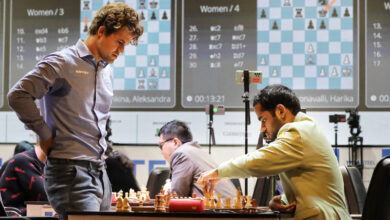Ian Nepomniachtchi made it clear the 8th move he was playing impotent and unambitious position

WHEN Russia’s Ian Nepomniachtchi made the eighth move of game 1 of the 2023 world chess championship, it was almost defined that the game was heading for a draw, which it eventually did. I felt that white was not playing ambitiously enough. It became obvious as early as the 8th move, after which it was just a routine play.
I expected Nepomniachtchi to go in for a strategic battle but in the very first game he chose a line which has a strategic idea. It’s not a typical idea. In fact, it’s a line which the Soviet School doesn’t approve of. But they still have some theory after move 8.
d3 is a normal move on move 8, but playing d4 on the eighth move, Nepomniachtchi made it clear that he was playing a sort of impotent and unambitious position.
A look at Ian Nepomniachtchi’s eighth move against Ding Liren in Game 1.
He was just trying to see if his Chinese opponent blunders or something. He was trying to outplay his opponent in a very simple position where a player of that stature is not likely to lose. It was not ambitious play at all the Russian. If he really wanted to do something he should have changed the course of the game on the 8th move itself.
Perhaps, Nepomniachtchi was just trying to see how bad his opponent is in some simple strategic positions. Maybe that was the type of test he was taking of his opponent today. Ding got into bad positions from such a simple opening. I have played such openings as well with black pieces and I have found no problems in equalising particularly with a position that occurs with eight moves.
Maybe today the Russian was just testing the basic knowledge and opening choice of the opponent. In future if he plays a more solid line with 8 d3, will Ding permit this line? I think that’s maybe a way of knowing if your opponent is prepared for this kind of battle.
What Nepomniachtchi tried on move 8, he may not try it again. He had tried it only to check his opponent’s tactical alertness and to keep him guessing. Nepomniachtchi wasn’t serious about trying to win the first game. Normally, it’s a strategy, I think. You assess your opponent’s current form in the first three-four games.
It is an indicator to Nepomniachtchi that even the simple positions that Ding is good at, sometimes he is not very comfortable in. At one stage, the game was not completely heading towards a draw. The Russian had a reasonable amount of advantage at one point, despite the simple opening which he started with. Then Ding made very accurate moves and it ended up as an easy draw. The time trouble Ding found himself in, in the middle of the contest, was because he had some important decisions to make on the board and he took his time to make those. The Russian’s moves in Game 1 were very obvious. Ding’s moves were more accurate.
Both players have got class, maybe Nepomniachtchi has got higher class. But again, in such contests form matters a lot.
Nepomniachtchi is a typical product of the Soviet School of chess where a lot of strategy was being taught along with the technique. Liren, on the other hand, comes from a country where there was no chess tradition as such. As things stand, Nepomniachtchi is strategically very strong and has good opening skills. Ding, on the other hand, is original and good in tactics.
If you see, Nepomniachtchi has taken a second trainer who is three years older than him, Nikita Vitiugov. This is a logical way of looking at a strategic battle. Meanwhile, Ding has enled the services of Richard Rapport (who is younger to him), which means he is looking for sharp tactical battles knowing his strengths and weaknesses.
In the Candidates Tournament, Nepomniachtchi proved to be a worthy successor to Magnus Carlsen winning it with one and half points more than others. He had 9 ½ points out of 14 to Ding’s 8 points. Ding was an outside entry into the event. He was unprepared, he started badly. But he still ended up coming second. He has a great ability to come back. That’s missing in Nepomniachtchi.
Ding’s a good fighter. The Chinese is out of practice compared to the Russian. China doesn’t have that sort of chess tradition as compared to the USSR, and now Russia, and some other former Soviet republics like Uzbekan and Kazakhstan. Even they have a rich chess legacy.
The Russian School of chess believes in strategy and building up to a war. But the Oriental School of chess is more or less all about over-the-board resourcefulness, decided on what happens when you play a particular opponent.
Until Game 4 of the world championship, I foresee players just looking into their preparations.
(As told to Amit Kamath)







